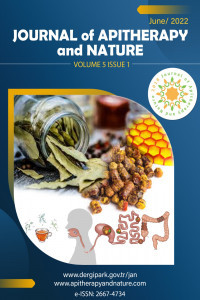Intestinal Morphology Broiler Chickens Supplemented with Propolis
Intestinal Morphology Broiler Chickens Supplemented with Propolis
Propolis, Broiler Chickens,
___
- 1. Toman R, Hajkova Z, Hluchy S (2015) Changes in intestinal morphology of rats fed with different levels of bee pollen. Pharmacognosy Communications 5: 261-264. 2. Wang J, Li S, Wang Q, Xin B, Wang H (2007) Trophic effect of bee pollen on small intestine in broiler chickens. Journal of Medicinal Food 10: 276-280. 3. Hajkova Z, Toman R, Galik B, Martiniakova M (2014) The effect of bee pollen consumption on functional morphology of small intestine of rats. Mendel Net 138-142.
- Yayın Aralığı: Yılda 2 Sayı
- Başlangıç: 2018
- Yayıncı: Oktay YILDIZ
ARC (Apiceutical Research Centre): Developing a Global BeePharma Network Local Help for Local Health
Antimicrobial Effect of Commercial Propolis Extract (BEEO©)
Aslı Elif TANUGUR, Sevgi KOLAYLI, Merve KESKIN, Sengul ALPAY KARAOGLU
New Antiproliferative Acyl Glycerols from New Zealand Propolis and Source Poplar Resin
Stephen BLOOR, Owen CATCHPOLE, Kevin MITCHELL, Rosemary WEBBY
Chemical Profile of Greek Arbutus unedo Honey – Biological Properties
αrgyrο ANDREOU, Ioanna CHINOU, Konstantia GRAIKOU
Soumaya TOUZANI, Sleman KADAN, Abdalsalam KMAIL, Bashar SAAD, Badiaa LYOUSSI
The Characterization and Bioactive Composition of Turkish Propolis
İlknur COSKUN, Gizem M. DUYMAZ, Tuğçe DASTAN, Ozge E. SONMEZER, , Sezer ACAR, Emir AKYILDIZ, Gamze DUZ, Ozlem YILMAZ, Sinem RADAY
Thirteen Flavonoids from Green Propolis from Minas Gerais, Brazil, Analyzed for Six Years
M. D. FREITAS, G. A. LOPES, N. A OLIVEIRA, B. M. ALMEIDA, S. R. L. ABREU, R. C. BASQUES, N. S. BINDA, S. M. FIGUEIREDO
Propolis from Romania and Turkey: Comparative Antioxidant and Antibacterial Activity
Otilia BOBIS, Merve KESKIN, Saban KESKIN, Sevgi KOLAYLI, Mihaela NICULAE, Adriana URCAN, Claudia PASCA, Liviu Al. MĂRGHITAS, Daniel S. DEZMIREAN
Toothpaste with Propolis “Apident” Shows Antimicrobial Activity in vitro
Klemen RIHAR, Dunja Gregorič EXEL, Adriana PEREYRA, Rok KOPINČ, Bratko FILIPIČ
Can Propolis Inhibit Infection Dynamics of Honey Bee (Apis mellifera L.) Viruses in vitro?
